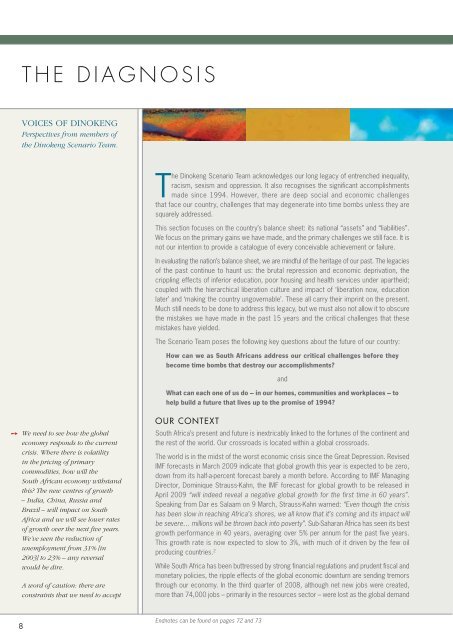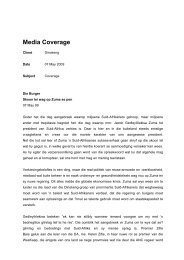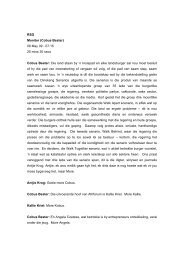Dinokeng Scenarios
Dinokeng Scenarios
Dinokeng Scenarios
Create successful ePaper yourself
Turn your PDF publications into a flip-book with our unique Google optimized e-Paper software.
THE DIAGNOSIS<br />
VOICES OF DINOKENG<br />
Perspectives from members of<br />
the <strong>Dinokeng</strong> Scenario Team.<br />
The <strong>Dinokeng</strong> Scenario Team acknowledges our long legacy of entrenched inequality,<br />
racism, sexism and oppression. It also recognises the significant accomplishments<br />
made since 1994. However, there are deep social and economic challenges<br />
that face our country, challenges that may degenerate into time bombs unless they are<br />
squarely addressed.<br />
This section focuses on the country’s balance sheet: its national “assets” and “liabilities”.<br />
We focus on the primary gains we have made, and the primary challenges we still face. It is<br />
not our intention to provide a catalogue of every conceivable achievement or failure.<br />
In evaluating the nation’s balance sheet, we are mindful of the heritage of our past. The legacies<br />
of the past continue to haunt us: the brutal repression and economic deprivation, the<br />
crippling effects of inferior education, poor housing and health services under apartheid;<br />
coupled with the hierarchical liberation culture and impact of ‘liberation now, education<br />
later’ and ‘making the country ungovernable’. These all carry their imprint on the present.<br />
Much still needs to be done to address this legacy, but we must also not allow it to obscure<br />
the mistakes we have made in the past 15 years and the critical challenges that these<br />
mistakes have yielded.<br />
The Scenario Team poses the following key questions about the future of our country:<br />
How can we as South Africans address our critical challenges before they<br />
become time bombs that destroy our accomplishments<br />
and<br />
What can each one of us do – in our homes, communities and workplaces – to<br />
help build a future that lives up to the promise of 1994<br />
➙<br />
We need to see how the global<br />
economy responds to the current<br />
crisis. Where there is volatility<br />
in the pricing of primary<br />
commodities, how will the<br />
South African economy withstand<br />
this The new centres of growth<br />
– India, China, Russia and<br />
Brazil – will impact on South<br />
Africa and we will see lower rates<br />
of growth over the next five years.<br />
We’ve seen the reduction of<br />
unemployment from 31% [in<br />
2003] to 23% – any reversal<br />
would be dire.<br />
A word of caution: there are<br />
constraints that we need to accept<br />
OUR CONTEXT<br />
South Africa’s present and future is inextricably linked to the fortunes of the continent and<br />
the rest of the world. Our crossroads is located within a global crossroads.<br />
The world is in the midst of the worst economic crisis since the Great Depression. Revised<br />
IMF forecasts in March 2009 indicate that global growth this year is expected to be zero,<br />
down from its half-a-percent forecast barely a month before. According to IMF Managing<br />
Director, Dominique Strauss-Kahn, the IMF forecast for global growth to be released in<br />
April 2009 “will indeed reveal a negative global growth for the first time in 60 years”.<br />
Speaking from Dar es Salaam on 9 March, Strauss-Kahn warned: “Even though the crisis<br />
has been slow in reaching Africa’s shores, we all know that it’s coming and its impact will<br />
be severe… millions will be thrown back into poverty”. Sub-Saharan Africa has seen its best<br />
growth performance in 40 years, averaging over 5% per annum for the past five years.<br />
This growth rate is now expected to slow to 3%, with much of it driven by the few oil<br />
producing countries. 2<br />
While South Africa has been buttressed by strong financial regulations and prudent fiscal and<br />
monetary policies, the ripple effects of the global economic downturn are sending tremors<br />
through our economy. In the third quarter of 2008, although net new jobs were created,<br />
more than 74,000 jobs – primarily in the resources sector – were lost as the global demand<br />
8<br />
Endnotes can be found on pages 72 and 73







